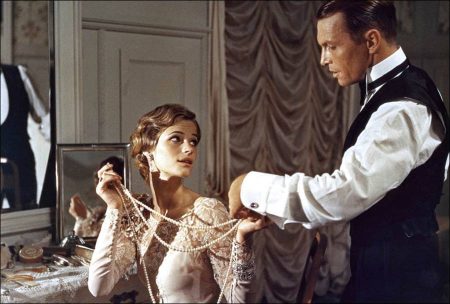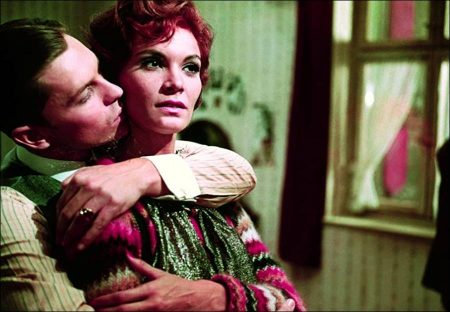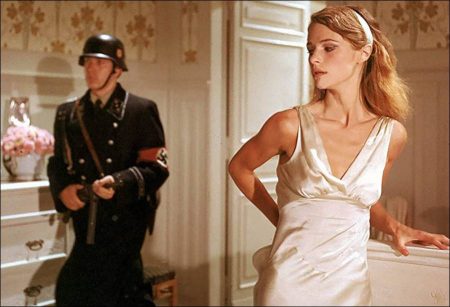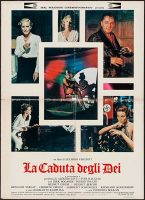Taglines: To cut the world’s throat they needed gold, steel and treachery. One family had it all.
The Damned movie storyline. The power and fortune of the Von Essenbeck family remained intact even when Germany lost World War I, and during the depression that followed. Now it’s 1934, and the baron has summoned his family to a dinner that also brings a cousin rising in the Nazi party to the great house accompanied by a rising manager at the baron’s company. Two little girls recite poetry in the parlor and then play hide-and-seek with their cousin Martin (Helmut Berger). Suddenly there is a scream. The baron has been shot with their father’s gun and the father flees the country.
The Damned (Italian title: La Caduta Degli Dei, lit. “The Fall of the Gods”) is a 1969 Italian-German historical drama film written and directed by Luchino Visconti. The plot centers on the Essenbecks, a wealthy industrialist family who have begun doing business with the Nazi Party, a thinly veiled reference to the Essen-based Krupp family of steel industrialists.
The Italian title is the conventional translation of the term Götterdämmerung (with its Wagnerian association), but for the German version, the title Die Verdammten (“The Damned”) was chosen. All versions, however, use Götterdämmerung as a subtitle. Filming took place in Italy and Germany.
The German Trilogy
The Damned has been regarded as the first of Visconti’s films described as “The German Trilogy”, followed by Death in Venice (1971) and Ludwig (1973). Author Henry Bacon, in his book Visconti: Explorations of Beauty and Decay (1998), specifically categorizes these films together in a chapter “Visconti & Germany”.
Visconti’s earlier films had analyzed Italian society during the Risorgimento and postwar periods. Peter Bondanella’s Italian Cinema (2002) depicts the trilogy as a move to take a broader view of European politics and culture. Stylistically, “They emphasize lavish sets and costumes, sensuous lighting, painstakingly slow camerawork, and a penchant for imagery reflecting subjective states or symbolic values”, comments Bondanella.
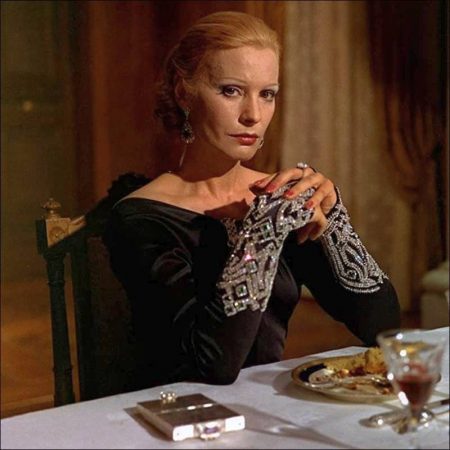
About the Story
The film centers on the Essenbecks, a wealthy industrialist family who have begun doing business with the Nazi Party. On the night of the Reichstag fire, the family’s conservative patriarch, Baron Joachim von Essenbeck, who represents the old aristocratic Germany and detests Adolf Hitler, is murdered. Herbert Thalmann, the family firm’s vice president, who openly opposes the Nazis, is framed for the crime. He escapes the grasp of the Gestapo, but his wife Elizabeth and their children do not.
The family’s empire passes to the control of an unscrupulous relative, the boorish SA officer Konstantin. Waiting in the wings are his son Günther, a sensitive and troubled student, and his nephew, Martin, an amoral, sexually deviant playboy who is secretly molesting his young cousin as well as a poor Jewish girl. Martin is dominated by his possessive mother, Sophie, the widow of Baron Joachim’s only son, a fallen World War I hero.
Friedrich Bruckmann, an employee of the family firm and Sophie’s lover, ascends in power despite his lowly social status, thanks to Sophie’s support and the SS officer and family relation Aschenbach, who pits family factions against each other to move their steel and munition works into state control. Friedrich kills Konstantin in the SS coup against the SA during its 1934 meeting to deal with its dissatisfaction with Hitler.
Known as The Night of the Long Knives, the SA meeting and the subsequent executions of its leaders by the SS is portrayed as a homosexual orgy and bloody gangster-style massacre. Aschenbach then dismisses Friedrich, who now controls the family fortunes, as a weak social climber and not a loyal Nazi.
The Damned (1969)
Directed by: Luchino Visconti
Starring: Dirk Bogarde, Ingrid Thulin, Helmut Griem, Helmut Berger, Renaud Verley, Umberto Orsini, Albrecht Schönhals, René Koldehoff, Florinda Bolkan, Charlotte Rampling
Screenplay by: Nicola Badalucco, Enrico Medioli, Luchino Visconti
Production Design by: Vincenzo Del Prato
Cinematography by: Pasquale De Santis, Armando Nannuzzi
Film Editing by: Ruggero Mastroianni
Costume Design by: Piero Tosi
Art Direction by: Pasquale Romano
Music by: Maurice Jarre
MPAA Rating: R for violence, nudity and aberrant sexuality.
Distributed by: Ital-Noleggio Cinematografico (Italy), Warner Bros.-Seven Arts (International)
Release Date: October 16, 1969 (Italy), January 27, 1970 (West Germany)
Views: 329
